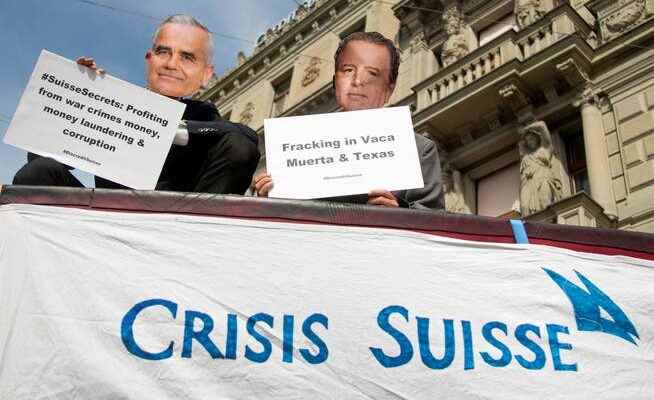On Thursday, the big bank will present its new strategy alongside probably weak quarterly figures. Insiders draw attention to the considerable potential for conflicts of interest on their board of directors and bring specific names into play.
Climate activists disguised as CEO Thomas Gottstein and board member Michael Klein demonstrated in April in front of the Credit Suisse headquarters in Zurich.
Thursday will be Credit Suisse Day. Then the big Swiss bank will probably not only present a third-quarter loss of a good half a billion francs with weak sales development, but above all also explain how it imagines the further operational future. After several scandals, massive share price losses, wild rumors and repeated changes in management, the new management has to present a liberation. The time for excuses is up.
Restructuring: the options are on the table
This not only raises the question of how the financial institution intends to position itself in the future, but how this plan is to be implemented in concrete terms. Ultimately, it is about how the company, which has gotten out of control due to mismanagement, can get away from a short-sighted fixation on the next quarterly result and switch to a sustainable long-term strategy. On the other hand, how he can increase the thin capital base with an unweighted equity ratio (T1) of around 6 percent and then allocate this to the individual business units more efficiently than before, taking into account the risks – and there are different ways to do this.
If insiders are to be believed, various media reports that have reported in the past few days about the cleansing of legacy legal issues, the accelerated part of parts of the company and, above all, the restructuring of the investment bank are entirely correct. The proceeds from the sale of stakes in Energy Infrastructure Partners – an asset manager for renewable energies – in the fund sales company Allfunds and parts of the asset management are intended to reduce the need for funds or perhaps even make them superfluous due to the downsizing of investment banking.
One idea seems to be to split the investment bank into three parts and revive a “bad bank” as a reservoir for risky assets. According to the proposals, which are said to have been put to the group’s board of directors, it also hopes to sell previously highly profitable units, such as the securitized products business, to competitors who could then leverage their economies of scale. According to well-informed sources, it is precisely at this point that it is worth taking a closer look at how such transactions are structured and implemented.
Significant conflicts of interest on the Board of Directors?
They argue that there is considerable potential for conflicts of interest on the Credit Suisse Board of Directors and even bring up specific names in this context: Blythe Masters and Michael Klein. In fact, the former lady not only manages a closed-end fund that invests in fintech companies, but she is also affiliated with private equity firm Apollo Global Management; she has been advising Apollo since 2021.
Apollo, in turn, is said to be interested in taking over the previously seemingly lucrative securitization business of Credit Suisse in New York City together with the Allianz subsidiary Pimco – in addition to the private New York investment company Centerbridge Partners with the ominous insurer Martello Re, the Japanese financial conglomerate Mizuho and the French Big bank BNP Paribas.
Michael Klein used to work for Citibank as a “rainmaker” in investment banking and was once considered a potential successor to the then CEO Sandy Weill. He left the major bank in 2008 to advise the UK government during the global financial crisis, to help British financial group Barclays acquire Lehman Brothers and to assist the Dubai government in restructuring state-owned conglomerate Dubai World.
In recent months, the man has made headlines as a self-employed entrepreneur, especially with so-called spac deals. As part of the temporary boom in this profession, he raised around one billion dollars for the special purpose vehicle Churchill Capital IV, which later merged with the electric car manufacturer Lucid. However, success there is still a long time coming and the price of the Lucid paper is under similar pressure as the Credit Suisse shares were recently.
Masters and Klein have grown with all waters in the financial sector, the insiders explain, but in view of the wide range of activities they are not always up to date. After all, the two people were members of the risk committee of the major Swiss bank when it was suddenly confronted with the Archegos scandal and finally had to write off billions. At the moment it cannot be completely ruled out that the other members of the Credit Suisse board of directors and CEO Ulrich Körner, who has no investment banking background, could not quite cope with the British and the American when it came to crucial transactions.
As part of an internal presentation, the two had recently suggested, according to media reports, that the Swiss financial institution could offer the investment bankers an equity stake in the division. A reference to the division’s spin-off and the revitalization of the First Boston brand at 11 Madison Avenue in New York City, rather than a major clear-cut?
